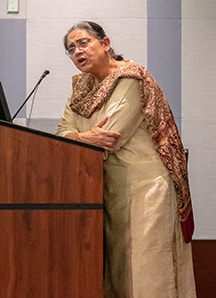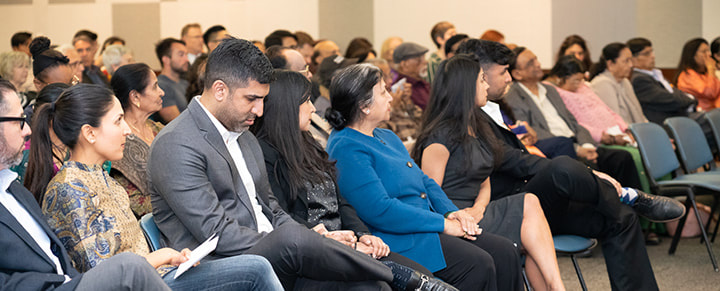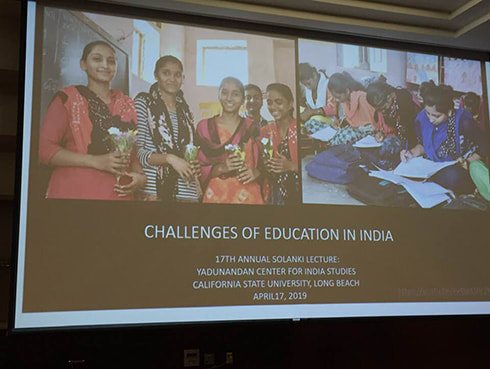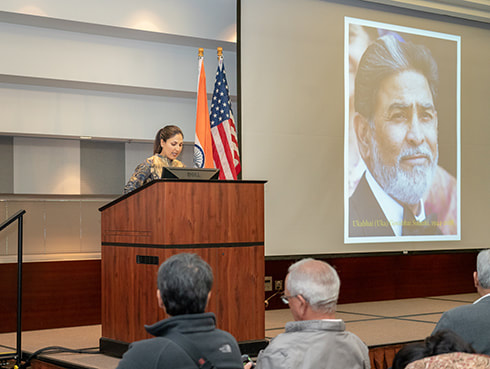By a Staff Reporter
LONG BEACH,CA - Dr. Rukmini Banerji, the CEO of India’s largest educational NGO, Pratham, delivered on April 17 this year’s Solanki Lecture. The Solanki Lecture is a major lecture series devoted to the history, culture, and politics of South Asia in the US and is sponsored by the Yadunandan Center for India Studies at...
LONG BEACH,CA - Dr. Rukmini Banerji, the CEO of India’s largest educational NGO, Pratham, delivered on April 17 this year’s Solanki Lecture. The Solanki Lecture is a major lecture series devoted to the history, culture, and politics of South Asia in the US and is sponsored by the Yadunandan Center for India Studies at...

California State University, Long Beach. The evening began with reminiscences about Uka Solanki, the entrepreneur, philanthropist, and founding donor of the Center who passed away last year. The remembrances were followed by the lecture by Dr. Banerji which was delivered to a crowded room of students, faculty, and members of the Indian-American community.
Dr. Banerji’s talk was titled ‘Challenges of Education in India.’ The presentation balanced forward progress in India’s education system with the difficulties that lie ahead. She discussed Pratham’s massive annual survey, the Annual Status of Education Report, which polls 600,000 students in over 16,000 villages in every Indian state.
She then described Pratham’s major initiative, the Combined Activities for Maximized Learning. This low-cost model involves grouping children according to ability rather than grade, allowing each child to work on mastering fundamentals before moving forward. These camps have proven to be incredibly effective. In a classroom in wihch only 25 percent of students have basics skills in reading and math, after a five-week camp, nearly 75 percent of students acquire these basic skills. India has an exceptionally rich and globally-significant history that is exemplified by numerous markers of historical development — the genesis and diffusion of dharmic religious and philosophical traditions, the origins and spread of key technologies, and the postcolonial formation of the world’s largest democracy to name but a few. In the contemporary world, India is a fundamental and rapidly expanding contributor to the global economy and a major strategic player in geopolitics. However, despite its historical and contemporary significance, most Americans know very little of India, nor do they appreciate its historical, cultural and current importance.
The Yadunandan Center also has a very special mission to improve and enhance the teaching and learning of India in K-12 schools and universities. This important work is well suited to its location at the California State University, Long Beach – a university with a major state and national reputation for excellence in teacher education and innovation in university teaching.
Dr. Banerji’s talk was titled ‘Challenges of Education in India.’ The presentation balanced forward progress in India’s education system with the difficulties that lie ahead. She discussed Pratham’s massive annual survey, the Annual Status of Education Report, which polls 600,000 students in over 16,000 villages in every Indian state.
She then described Pratham’s major initiative, the Combined Activities for Maximized Learning. This low-cost model involves grouping children according to ability rather than grade, allowing each child to work on mastering fundamentals before moving forward. These camps have proven to be incredibly effective. In a classroom in wihch only 25 percent of students have basics skills in reading and math, after a five-week camp, nearly 75 percent of students acquire these basic skills. India has an exceptionally rich and globally-significant history that is exemplified by numerous markers of historical development — the genesis and diffusion of dharmic religious and philosophical traditions, the origins and spread of key technologies, and the postcolonial formation of the world’s largest democracy to name but a few. In the contemporary world, India is a fundamental and rapidly expanding contributor to the global economy and a major strategic player in geopolitics. However, despite its historical and contemporary significance, most Americans know very little of India, nor do they appreciate its historical, cultural and current importance.
The Yadunandan Center also has a very special mission to improve and enhance the teaching and learning of India in K-12 schools and universities. This important work is well suited to its location at the California State University, Long Beach – a university with a major state and national reputation for excellence in teacher education and innovation in university teaching.




 RSS Feed
RSS Feed
